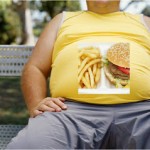
The problem with fast food is more the "fast" than the "food".
by Arya M Sharma
If McDonalds took 30 minutes to serve you a hamburger, no one would eat there. If it took you 30 minutes to enjoy a Happy Meal, no one would bother. That same goes for any fast food restaurant.
Now let’s take the debate of whether a fast food meal is healthy or unhealthy out of the equation. Any calorically dense food that can be "inhaled" (bite and swallow — no chewing required!), will increase your likelihood of overeating.
In other words, the problem with fast food is more the "fast" than the "food."
More importantly, "fast" is one of a cluster of cultural values that may not be good for our health — like its near cousin, “cheap.” The issue is not that fast food chains could not make a supremely healthy hamburger using the finest and leanest AAA beef, the choicest organically grown lettuce, tomatoes and onions, lovingly placed between a whole grain artisanal bun.
The truth? We simply do not value healthy food enough to want to spend either the time, effort or money that healthy eating demands.
The issue is just that they cannot make it for $3.50 and still expect to make a profit. This healthy and nutritious "gourmet" burger would likely cost $15, a price few consumers are willing to pay, even if they could afford it.
And then there’s “convenience.” Apparently we are not cultured enough to know better than to eat at our desks, in our cars, while on the phone, during meetings, or in front of our TVs — consuming food out of a cardboard box using nothing but our fingers.
The truth? We simply do not value healthy food enough to want to spend either the time, effort or money that healthy eating demands.
If we accept that healthy eating best consists of eating mostly home cooked meals prepared from fresh ingredients, eaten at a table, enjoyed mindfully with ample chewing (and don't forget to floss), we are looking at a minimum of 60 to 90 minutes a day devoted exclusively to eating. This recognizes that the "nourishment" we derive from healthy eating is as much a function of the nutritive value of foods as it is of the setting in which they are consumed.
Perhaps the most devastating impact of time starvation is when it cuts into our sleep. We live in a society that runs on caffeine — a sure sign of chronic sleep deprivation.
Whether or not we value healthy eating enough to carve out 90 minutes from our already busy time-starved schedules is the real question.
But time does not just limit our ability to eat healthy. It also limits our ability to be physically active. Most of us choose not to use active or public transportation, simply because driving our cars saves us time. We use power tools and household appliances simply because they get the job done quicker than the old fashioned way.
This need to save time and increase productivity is what ultimately reduces our physical activity levels. Only seldom do we translate these time savings into time for exercise — more often than not, any time saved gets spent on even more sedentary activity.
Perhaps the most devastating impact of time starvation is when it cuts into our sleep. We live in a society that runs on caffeine — a sure sign of chronic sleep deprivation. Not only does sleep deprivation promote cravings for unhealthy foods, it also reduces our motivation and drive to be physically active — we are literally "exhausted."
This chronic lack of time also drives our stress levels leaving us anxious, guilty, irritable, frustrated and burnt out under a dark cloud of impeding doom, thereby laying a fertile field for emotional eating.
As I have yet to acquire a time-saving device that actually saves me time, I can see that there is no easy way out of this dilemma. Yes, there is always room for some increase in efficiencies and much is to be said for planning and prioritizing. Yet, whether we choose to reallocate our limited time to eating healthier, being more active, and catching up on our sleep, will ultimately determine whether or not we become healthier as individuals, as families, and as a society.
The obesity epidemic is as much an epidemic of time starvation as it is of overconsumption. That the two are intimately linked is an uncomfortable truth that often gets lost in discussions that focus on simplistic "eat-less-move-more" solutions to addressing the obesity problem.
The obesity epidemic is as much an epidemic of time starvation as it is of overconsumption.
It may well be best to begin your journey to a healthier you by first tracking and questioning how you spend your time before tracking what you eat or how many steps you walk.
© Copyright 2013 Arya M Sharma, All rights Reserved. Written For: StraightGoods.ca2 Responses to “Time starvation causes obesity”
Sorry, the comment form is closed at this time.

 Arya M Sharma, MD, is an expert advisor with
Arya M Sharma, MD, is an expert advisor with
In other words, North Americans should stop criticising the French, and start emulating them.
What a great idea. I remember visiting with French friends. We went out for a lunch that could easily last an hour, with wine, and casual conversation, often in fresh air. There was never the least sense of hurry, in fact we often had visitors join the conversation and suggestions were made to visit an art display, museum, or just stroll after lunch. Very relaxing, and I am sure healthier.